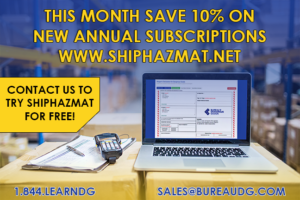
Offering or transporting dangerous goods/hazmat involves risk. A robust regulatory system (and industry best practices) is in place to reduce the risk as much as possible. Robust hazmat training programs educate hazmat employees of their responsibilities as part of the dangerous goods supply chain. These same training programs also ensure compliance with hazmat regulations. Reputable shipping manufactures and or suppliers warn the public of the presence of dangerous goods. Proper packaging is crucial to contain dangerous goods and separates them from the environment and to protect the world.
What happens when something goes wrong? Who is watching to make sure everyone is following the dangerous goods regulations? What should you do when you spot willful non-compliance with the hazmat regulations? The hazmat regulatory structure includes enforcement activities to work through these situations.
How are the Hazmat Regulations Enforced?
In the United States, the Pipeline and Hazardous Materials Safety Administration (PHMSA) is the lead agency for writing and enforcing the Hazardous Materials Regulations (HMR). Other transportation agencies including the Federal Aviation Administration (FAA), Federal Motor Carrier Safety Administration (FMSCA), and the Federal Railroad Administration (FRA) will also conduct outreach or investigations as needed for a specific mode.
Within PHMSA, enforcement is handled by the Office of Hazardous Materials Safety Field Operations. There are 5 regional offices within the Field Operations unit that perform anything from enforcement investigations, managing outreach programs and training.
Investigations may be prompted by an incident involving dangerous goods, complaint reports from carriers, special permit/competent authority application, or research done at the field office. Investigators will often visit businesses that have registered as required in 49 CFR §107.601 to look at their procedures to make sure the company is shipping material properly. Hazmat packaging manufacturers are often visited by investigators to ensure that testing requirements, manufacturing, and recordkeeping are in order.
What Happens When an Investigator Stops By?
PHMSA outlines enforcement actions in §107.301 – §107.339. The meeting will start with an explanation of why the investigator is onsite. You will likely be asked to furnish information or documents as evidence. The investigator may also request interviews with hazmat employees.
Once the investigation is complete, the company may receive any one of several outcomes. A letter of termination may be sent stating that no further action is necessary from the investigation. If the investigator finds problems, a warning letter, a ticket, or notice of probable violation may be issued. If a ticket or notice of probable violation is issued, a person may send an informal response or request a formal hearing. The notice from the investigator will include the next steps that may be taken.
What are the Penalties for Non-Compliance with Hazmat Regulations?
A person that knowingly violates a requirement of the HMR may be fined a maximum of $84,425 for each violation or $196,992 for a violation that results in death, serious illness, or severe injury to any person or substantial destruction of property. There is no minimum civil penalty, except for a minimum of $508 for violations relating to training. If there is a continuing violation, penalties may be assessed for each day the violation continues. Some violations of the regulation may bring criminal proceedings against a person.
Appendix A to subpart D of Part 107 outlines the guidelines for civil penalties. This section of the 49 CFR lists possible violations and the recommended penalties for each.
While you may not be able to avoid a visit from an investigator, you can certainly reduce your chances of non-compliance with the regulations. PHMSA’s website has many tools that can be used to help build a strong hazmat transportation program within your company. Track changes to hazmat regulations through trade associations, blogs, dangerous goods consultants, or the Federal Register. Finally, get quality training. Proper training is the best way to make sure that all employees understand that the hazmat regulations exist, how to comply with them, and what their responsibilities are.
Avoid Non-Compliance and Master the Hazmat Regulations With Hazmat University
Hazmat University is a worldwide leader in hazmat regulations training programs. Our flexible and intuitive online training modules make staying compliant engaging and convenient. Browse our course menu or get in touch with our team at (844) 532-7634 or (609) 493-4972!
May Promotion
ShipHazmat – Subscribe for a Free Trial Today

